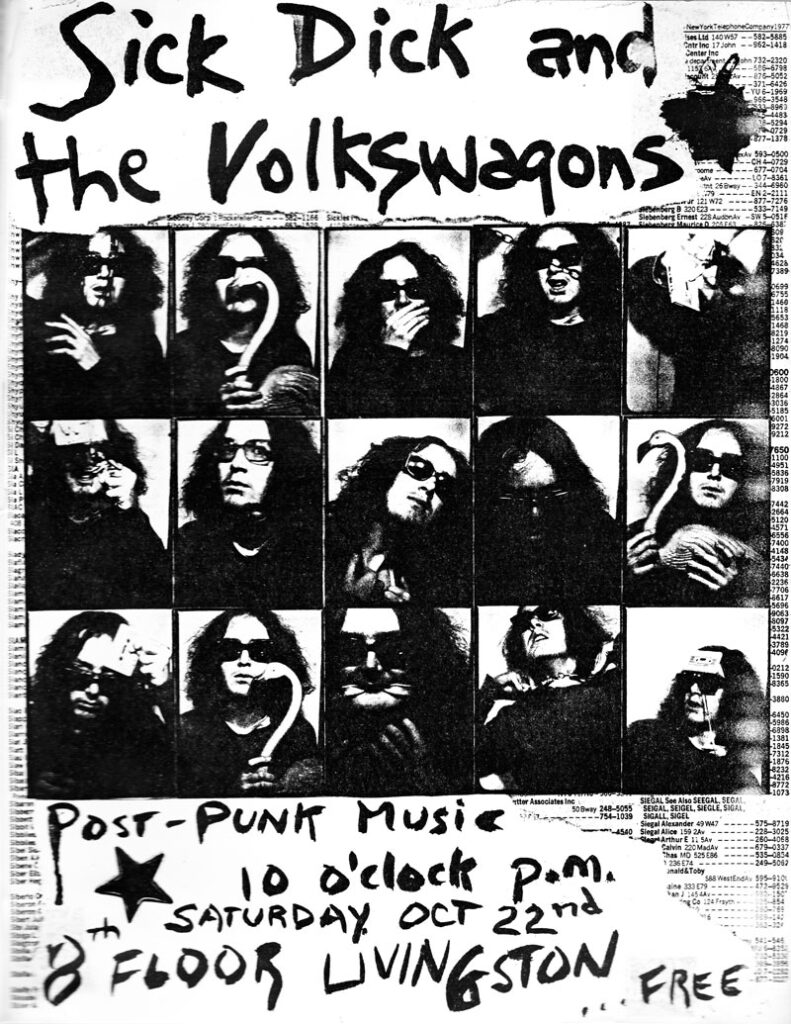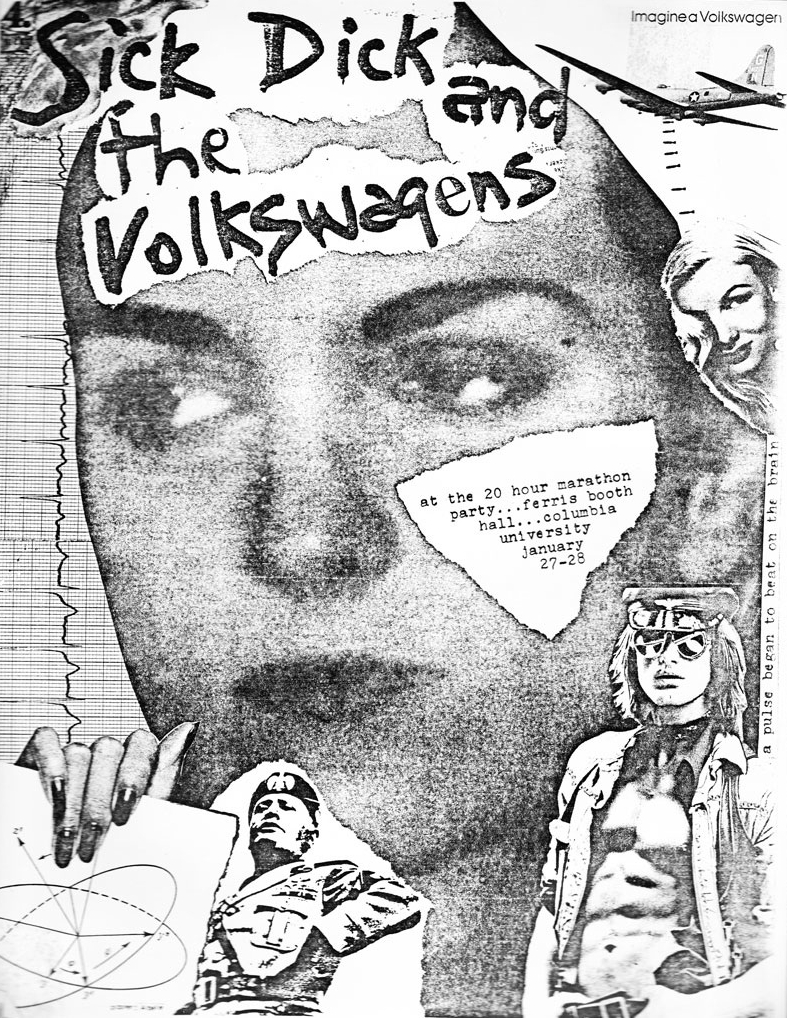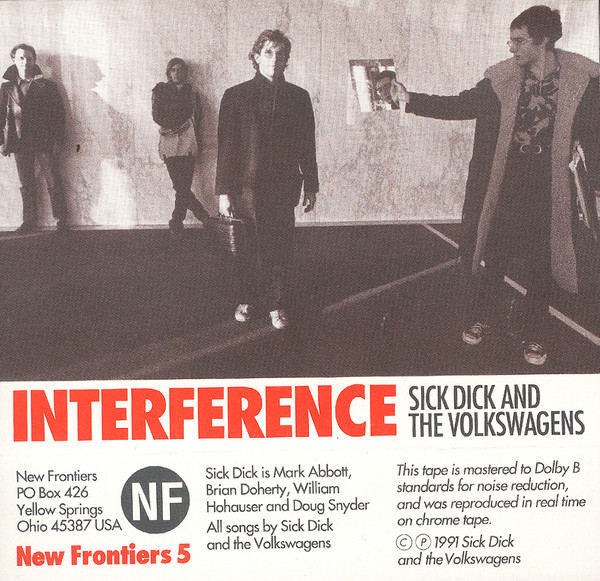Pynchon Music: Sick Dick and the Volkswagens
No-Wave Interference
Mucho Maas, enigmatic, whistling “I Want to Kiss Your Feet,” a new recording by Sick Dick and the Volkswagens…
—Thomas Pynchon, “The Crying of Lot 49”
Sick Dick and the Volkswagens (1977–1983)
Sick Dick and the Volkswagens are one of those strange bands that remain shrouded in mystery, even in today’s world of instantaneous information, streaming downloads, and deep-dive excursions into twentieth-century music scenes. Most of what’s known has been assembled from snippets—concert posters, cassette foldouts, long-vanished ‘zines, ghost site devoted to No Wave, the odd interview focusing on a different group. Even the line-up and which instruments they played remains uncertain, obscured in a Downtown haze of distortion and grime.
In 1973, Ohio guitarist Doug Snyder teamed up with drummer Bob Thompson in Thompson’s vacation cabin and recorded Daily Dances, an avant-garde “noise” album partially inspired by the Velvet Underground and MC5. Now considered an ahead-of-its time masterpiece, the album propelled both men into new directions. Thompson went on to drum for Pharoah Sanders, while Snyder relocated to New York City.
Trading his guitar for a bass, Snyder joined forces with a few other noise rockers—Donald Miller, a guitarist who shared Snyder’s love for the Velvet Underground, and hosted a radio show on Columbia University’s WKCR; Mark Abbott, a guitarist, electronics musician, and producer associated with John Zorn’s early “game pieces” recorded at WKCR; Brian Doherty, another guitarist/electronics musician; and William Hohauser, a sax player who once admitted to John Zorn, “I can’t play sax!” Taking their band name from Thomas Pynchon’s The Crying of Lot 49, Sick Dick and the Volkswagens landed their first gigs through connections with John Zorn, Glenn Branca, and Bill Laswell.
Sick Dick and the Volkswagens became identified with New York’s emerging “No Wave” scene, a post-punk movement that blended distorted noise-rock with punk aesthetics and political views that barreled through anarchy straight to nihilism. Indeed, it was a sound already present on Daily Dances, but now there was a groove. Less artsy than Sonic Youth and more rock-oriented than Suicide, Sick Dick and the Volkswagens played the usual haunts—CBGB’s, Max’s Kansas City—and managed to earn the praise of Lester Bangs, who joined the group onstage during a gig at the Ear Inn. The group recorded an LP called Interference, but it was never released, and is now considered a “lost” album.
In February 1979, Miller met saxophone players Jim Sauter and Dan Dietrich through his Columbia University radio show, and soon the trio formed Barbetomagus, an experimental free-jazz/noise band that occasionally enrolled Doherty on electronics. Meanwhile Sick Dick continued to play—with or without Miller, it’s not clear—until quietly drifting apart in 1982, or possibly 1983. Doug Snyder moved back to Ohio, while Barbetomagus continued to expand and contract to various degrees. In the 1990s, Miller and Doherty also played in the noise-rock outfit, Lhasa Cement Plant.
In 1991 Doug Snyder’s New Frontiers label released Interference, a Sick Dick compilation cassette. Although it shares a title with the “lost” LP, it’s apparently different material, recorded live and during rehearsals. It captures the band surprisingly well, offering a coherent portrait of a group playing in their prime. Like most No Wave recordings, things are lo-fi and fuzzy, but that adds to the appeal. Powered by a rhythm box that sounds like a factory producing an endless stream of cash registers, the music is propelled through waves of distorted guitar by Snyder’s motorik bass-line. Vintage electronics add welcome squeals of color, while the tracks containing Hohauser’s saxophone smolder like Nik Turner’s Hawkwind. The vocals are a delight; a fusion of nervy commentary and punk-rock snarling that invokes the period even more than the dated electronics. (In keeping with the nimbus of uncertainty surrounding the group, exactly which member of Sick Dick was the vocalist seems to have escaped documentation!)
Pynchon Connection
Sick Dick and the Volkswagens take their name from a humorous line in Pynchon’s 1965 novel, The Crying of Lot 49:
Given the popularity of “I Want to Hold Your Hand” in 1963, Pynchon’s band is certainly a goofy reference to the Beatles, who auditioned under the name “Johnny and the Moondogs,” and later considered the name “Long John and the Silver Beetles” before settling on “Silver Beatles” for a spell. Of course there’s zero similarity between Pynchon’s Sick Dick and the band that borrowed the name, but that could be part of the joke. Which member came up with the name, and why, are facts unknown or unrecorded. However, Donald Miller formed Barbetomagus with Jim Sauter and Dan Dietrich, who’d later team up with Sonic Youth’s Thurston Moore to record the album Barefoot in the Head. And this album sported bogus liner notes “written” by—who else?—Thomas Pynchon.
 Click to enlarge, then look at the phone book names: SIEGEL? From just after 1977?—Coincidence?
Click to enlarge, then look at the phone book names: SIEGEL? From just after 1977?—Coincidence?
Liner Notes
“Excruciatingly arty.” Slash magazine. Sick Dick and the Volkswagens was formed at Columbia University in 1977. Their first performance of a song called I Wanna Be Your God (get it?) was immortalized in a Rolling Stone review of Mel Brooks’ film High Anxiety, in which someone is locked in a car and killed by the car radio. Dave Marsh wrote that was only plausible if the radio was playing Sick Dick and the Volkswagens.
“10” Lester Bangs, Village Voice Pazz & Jop Poll. The late/great rock critic Lester Bangs was a friend and supporter of the band. Lester brought guitarists Robert Quine nd Ron Asheton to a couple of gigs, and joined Sick Dick for a set at Ear Inn.
John Zorn was another friend, and they played at his Theatre of Musical Optics. Glenn Branca got Sick Dick their second gig (at a SoHo gallery). The band performed often at a club called Zu, Giogio Gomelski’s space. Bill Laswell played in Giogio’s Zu Band.
“Now they will be able to reach the audience they so richly deserve.” New York Rocker. Sick Dick recorded an LP for Charles Ball’s Infidelity label, but it was never released. Interference, as it was called, was listed in Bob George’s book Volume as “…coordinating elements of rock, improvisation and experimental electronics.”
Sick Dick hasn’t performed since a 1982 gig in Damrosh park at Lincoln Center. During the band’s heyday, it played at Max’s Kansas City, CBGB’s, the Ear Inn, the Cooper-Hewitt Museum, the Experimental Intermedia Foundation, Franklin Furnace, and Hurrah, among others. These recordings were made during rehearsals and performances in New York City from 1979 to 1981.
Music
2. TVA (7:08)
3. When the Tapeworm Comes (5:39)
4. Flame Flows Down (6:02)
5. Corruption (7:00)
6. Thrill Me (9:28)
7. Comments On an Axe (5:58)
Doug Snyder—bass.
Donald Miller—guitar.
Brian Doherty—electronics.
Mark Abbott—guitar & electronics.
William Hohauser—saxophone.
Additional Information
Last Modified: 10 December 2021
Back to: Pynchon on Record
Main Pynchon Page: Spermatikos Logos
Contact:quail(at)shipwrecklibrary(dot)com



